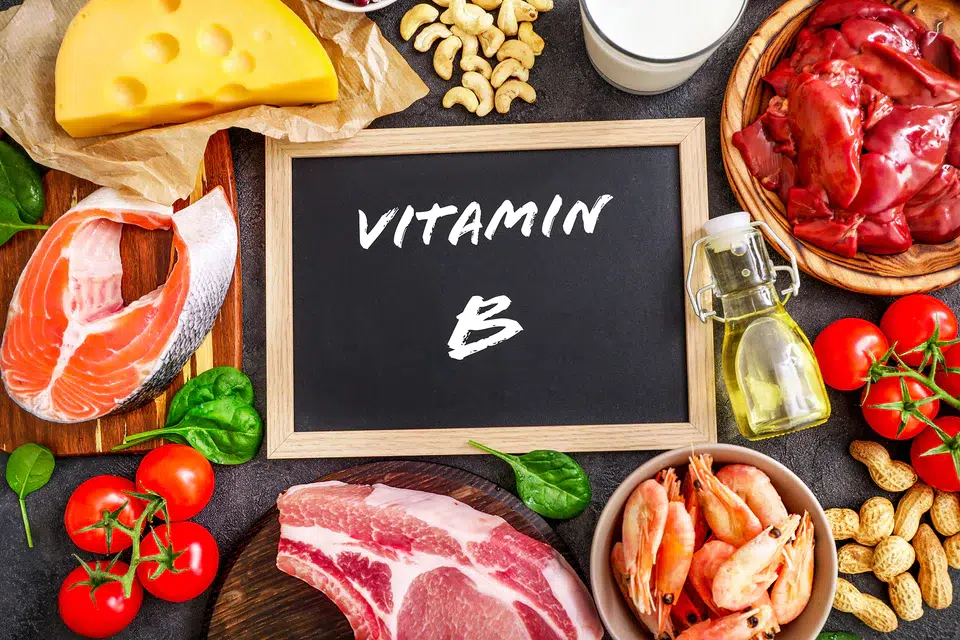To maintain health it is important to have a well balanced diet that includes the essential B complex vitamins. These vitamins play a role in our overall well being by aiding in energy production supporting metabolic processes promoting cognitive health maintaining skin health and supporting brain functions.
The purpose of this article is to delve into the world of the vitamin B complex and highlight the benefits associated with each individual B vitamin. Additionally it provides a list of foods that can help you meet your recommended daily intake of these vitamins.
Including these rich foods in your diet can have a significant impact on your vitality and longevity. This information caters to both individuals who’re conscious, about their health and those looking to enhance their dietary habits.
What is Vitamin B-Complex?
A group of vitamins that dissolve in water, known as the vitamin B complex work together to support important bodily functions.
This combination of eight vitamins. B1 (thiamine) B2 (riboflavin) B3 (niacin) B5 (pantothenic acid) B6 (pyridoxine) B7 (biotin) B9 (folate) and B12 (cobalamin). Plays a crucial role in maintaining overall health and well being.
These vitamins act as coenzymes in metabolic pathways making them necessary for converting food into usable energy. They also assist with DNA synthesis and repair promote brain function support the production of blood cells maintain the integrity of the nervous system and enhance cognitive function.
Since our bodies have limited ability to store these vitamin B complex it is important to replenish them through supplements or, by including them in a balanced diet [1].
It’s worth noting that while each individual vitamin B complex has its unique properties and benefits they often work together harmoniously to maximize their effectiveness.
What are the different types of the vitamin B complex?

To ensure we get B vitamins it’s important to include a diverse range of foods, in our daily diet.
The various components of the vitamin B complex include:
Vitamin B1 (Thiamine)
Thiamine, which is also referred to as vitamin B1 plays a role in both nerve function and energy metabolism. It is essential for producing adenosine triphosphate (ATP) the source of cellular energy and helps convert carbohydrates into usable energy.
Thiamine holds significance, in maintaining the proper functioning of the neurological system. It greatly contributes to the well being of neurons. Facilitates the transmission of nerve impulses. Furthermore thiamine supports metabolic processes involving proteins, lipids and nucleic acids which ultimately benefits cellular health.
Vitamin B2 (Riboflavin)
Vitamin B2, also known as riboflavin plays a role as an important nutrient influencing the bodys energy production processes and various cellular functions.
Riboflavin actively contributes to the metabolism of fats, proteins and carbohydrates aiding in their conversion into available energy sources.
Moreover riboflavin acts as an antioxidant actively participating in neutralizing free radicals and safeguarding cells against oxidative damage [2].
Aside, from these functions riboflavin supports the functioning and upkeep of mucous membranes, eye structures and skin health while promoting overall well being.
Vitamin B3 (Niacin)
The proper functioning of enzymes involved in metabolism, which are crucial for converting the nutrients we consume into energy relies on the presence of niacin.
Niacin also plays a role in promoting neurological well being and maintaining the overall health and condition of our skin, hair and nails.
Including niacin foods in our diet offers several advantages. Niacin helps regulate levels of cholesterol and supports healthy blood circulation, both of which contribute to cardiovascular well being.
Furthermore niacin plays a role in supporting cognitive function and reducing inflammation processes.
It’s important to note that a deficiency in niacin can lead to pellagra a condition characterized by symptoms like skin inflammation, digestive issues, mental impairment and mucous membrane inflammation. However severe niacin deficiency is uncommon, among individuals who follow a diet.
Vitamin B5 (Pantothenic acid)
Coenzyme A (CoA) which contains acid is a vital component in the metabolic pathways related to fatty acids and the creation of important substances such as cholesterol, hormones and neurotransmitters [3].
Consuming foods that are rich in vitamin B5 offers advantages. Pantothenic acid plays a role in maintaining skin health by promoting the growth and upkeep of skin cells.
Furthermore it actively takes part in synthesis thereby enhancing the structural integrity of the skin.
Moreover vitamin B5 aids in maintaining a nervous system by assisting in the production of neurotransmitters that facilitate communication between nerve cells.
Pantothenic acid also plays a role in synthesizing hemoglobin, the protein essential, for transporting oxygen in red blood cells.
Vitamin B6 (Pyridoxine)
Pyridoxine has a role in promoting brain growth and optimal functioning. It plays a part in synthesizing neurotransmitters that greatly impact mood regulation, sleep patterns and cognitive processes. Specifically pyridoxine aids in the creation of neurotransmitters like serotonin, dopamine and gamma aminobutyric acid (GABA).
Moreover this vitamin is vital for the metabolism of proteins, carbohydrates and lipids. It actively participates in converting nutrients into energy to support essential physiological functions.
Alongside its metabolic functions pyridoxine also contributes to the production of hemoglobin—the protein, for transporting oxygen through the bloodstream.
Vitamin B7 (Biotin)
Biotin is well known for its ability to support the health of skin, hair and nails. It plays a role in developing and maintaining these tissues enhancing their strength and vitality.
Apart from its effects on the skin and hair biotin is vital for synthesizing fatty acids that’re necessary for fortifying cell membranes. It also aids in regulating gene expression and facilitating the metabolism of amino acids.
Furthermore biotin plays a part in promoting insulin activity, which helps regulate normal glucose levels in the body. Additionally it stimulates the production of keratin, the protein responsible, for forming hair and nails.
Vitamin B9 (Folate)
Folate has a role in the development of the neural tube in an unborn baby, which eventually becomes the brain and spinal cord. This makes folate crucial for promoting fetal growth during pregnancy.
Having an intake of folate is essential to prevent neural tube defects in newborns highlighting its importance in prenatal nutrition.
Furthermore folate actively participates in the creation and upkeep of DNA and RNA which’re the fundamental building blocks of our genetic material.
Aside from its functions folate also helps break down homocysteine, an amino acid that has implications for heart health. Additionally it plays a part, in blood cell production.
Vitamin B12 (Cobalamin)
Vitamin B12, also known as cobalamin is a water vitamin that plays a crucial role in various essential biological processes. Its importance extends to critical functions within the human body.
Foremost vitamin B12 is vital for the synthesis of DNA, which’s a fundamental process enabling the creation of genetic material inside cells. This function is necessary for the growth, development and maintenance of all body tissues.
Moreover vitamin B12 has an involvement in the production of red blood cells. These red blood cells have the task of carrying oxygen to different tissues and organs throughout the body. Insufficient supply of vitamin B12 can disrupt blood cell production leading to anemia and related health issues.
Additionally apart from its role in hematopoiesis vitamin B12 is essential for neurological functioning. It actively supports the health and functioning of nerve cells that play a part in transmitting signals within the nervous system. This neurological support is necessary for maintaining function, motor skills and sensory perception.
Furthermore cobalamin significantly contributes to the metabolism of fatty acids and amino acids. Its involvement in metabolic pathways plays a role, in energy production and overall body balance.
To sum it up vitamin B12, which is also referred to as cobalamin is a nutrient that dissolves in water and plays a role in DNA synthesis the production of red blood cells, neurological function and the metabolism of fatty acids and amino acids. These various functions highlight its role, in maintaining overall health and well being.
What vitamin B-rich foods should you include in your diet?
In order to ensure an adequate intake of B vitamins, it is important to include a variety of nutrient-dense foods in your diet.
Below is a selection of prominent foods that can help meet your B vitamin needs:
1. Whole grains
Whole grains are a treasure trove of nutrients packed with a diverse range of important components like B vitamins.
With minimal processing the unrefined parts of these grains such as the bran, germ and endosperm retain their nutritional value.
By incorporating grains into your diet you can boost your intake of B vitamins and enjoy the numerous health benefits they provide.
Brown rice, quinoa, oats, whole wheat and barley are examples of grains that are abundant in B vitamins like thiamin, riboflavin and niacin. These vitamins play roles, in energy metabolism, cognitive function and overall well being [4].
Introducing grains into your meals can be both simple and creative. You can make nutritional improvements by substituting refined grains with their whole grain alternatives. For instance choosing quinoa of refined pasta or opting for whole wheat bread over white bread or brown rice instead of white rice is a convenient way to achieve this dietary upgrade.
2. Fish and seafood
Fish, fatty types like salmon, trout and mackerel are excellent sources of easily absorbed Vitamin B12. This vitamin plays a role in DNA synthesis, neuronal function and the production of red blood cells.
Including fish in your diet can be a dependable way to ensure you’re getting enough Vitamin B12. Additionally seafood and fish are also abundant in niacin and riboflavin which’re crucial for cellular function, energy metabolism, as well, as maintaining healthy skin, eyes and mucous membranes.
3. Eggs
Riboflavin, which is abundant in eggs plays a role in the production of red blood cells keeping our skin healthy and improving our vision. It also acts as a component in energy metabolism processes.
Moreover eggs are a source of pantothenic acid, an essential B vitamin that actively contributes to energy production, hormone synthesis and the development of red blood cells.
Furthermore eggs naturally contain vitamin B12, which’s vital for DNA synthesis maintaining proper neurological function and producing red blood cells [5]. Since vitamin B12 is mainly found in animal based foods it’s especially important, for individuals following a vegetarian or vegan diet to ensure they have intake.
4. Leafy green vegetables
Green leafy vegetables like spinach, kale and collard greens contain amounts of folate. Folate is crucial for producing blood cells synthesizing DNA and facilitating cell division.
Ensuring sufficient intake of folate is vital for promoting fetal development during pregnancy.
Riboflavin is also present in leafy vegetables like spinach and collard greens. This nutrient plays a role in energy metabolism maintaining the health of skin and eyes as well as supporting the nervous system.
Leafy greens such as kale and lettuce are sources of niacin. Niacin plays a role, in hormone synthesis DNA repair mechanisms and energy metabolism.
5. Spinach
Spinach is well known for its benefits. It contains levels of magnesium which can help promote a sense of calm and stability. Additionally spinach is packed with vitamin B6, a nutrient that plays a role, in the production of serotonin, a neurotransmitter associated with well being.
When it comes to cooking spinach offers versatility as it can be used in both cold dishes. It’s important to note that some of the vitamin content may be lost during the cooking process. To retain its value its recommended to steam the spinach. You can enjoy spinach leaves in salads alongside ingredients, like goat cheese, beetroot or walnuts. Another delicious option is to steam spinach with garlic as a vegetable side dish.
Bottom Line
Including foods that’re rich in B vitamins is essential for maintaining overall well being. These foods come from sources such as whole grains, lean meats, fish, eggs, dairy products green leafy vegetables and fortified foods.
B vitamins play a role in vital biological processes within the body like DNA synthesis, neuronal function and energy metabolism.
Incorporating these nutrient packed foods into your diet ensures that you receive an amount of B vitamins and allows you to benefit from their numerous health advantages.
To receive personalized advice its recommended to maintain a balanced and diverse eating pattern.
Take the step, towards better health by adding B vitamin rich foods to your daily diet.
FAQs
Are there specific populations at higher risk for B vitamin deficiency?
Some people, like individuals, vegetarians and those with health conditions such as celiac disease or gastrointestinal disorders might have a higher chance of lacking in B vitamins. It’s crucial for these groups to keep an eye, on their B vitamin consumption and think about taking supplements if necessary.
How can you tell if you have a vitamin B deficiency?
The symptoms you may experience can be influenced by a deficiency of B vitamins, in your diet. However typical signs could involve feeling irritable having mood swings experiencing muscle weakness having a complexion, numbness or tingling in your extremities and feeling fatigued.
How do you get enough B vitamins in your diet?
In fact, a well-rounded and varied diet can make it easier to get enough B vitamins. Whole grains, lean meats, fish, eggs, dairy products, green leafy vegetables, and fortified foods are rich sources of B vitamins.
What role do B vitamins play in heart health?
Certain B vitamins, specifically B6, B12 and folate, play a role, in controlling the levels of homocysteine in the bloodstream. Increased levels of homocysteine can increase the risk of disease. Consuming amounts of these B vitamins through a diet or supplements could potentially lower homocysteine levels and thereby reduce the risk of heart disease. Nonetheless it is important to note that the connection, between B vitamins and heart health is intricate and requires investigation.
How to evaluate the risks and side effects associated with B vitamin use?
When you get B vitamins from foods they usually don’t cause any problems and are generally well tolerated. However if you take doses of B vitamins, like B6 and B12 through supplements there may be some potential side effects to watch out for. These could include things like nerve damage or issues, with your system.





